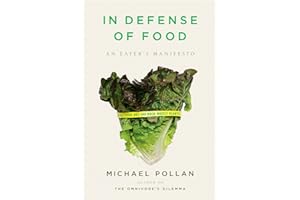One sentence summary:
A thought-provoking and informative book that challenges readers to question the Western diet and suggests a return to whole, unprocessed foods for better health.
Book genre:
Non-fiction, Health and Nutrition
Main topic of the book:
Michael Pollan’s “In Defense of Food” explores the impact of modern industrialized food production on our health and eating habits, and argues for a return to a more natural and traditional way of eating.
Key ideas:
- Western society has become obsessed with nutritionism, or breaking down food into its individual components and judging its health benefits based on isolated nutrients rather than whole foods.
- The rise of processed and packaged foods has greatly contributed to the decline in health, particularly in terms of chronic diseases such as obesity, diabetes, and heart disease.
- Our current diet is heavily influenced by the food industry, which prioritizes profits over health and promotes highly processed and “low-fat” products as healthy alternatives.
- In order to reclaim our health, we must return to a more natural and traditional way of eating, focusing on whole, plant-based foods and avoiding processed and packaged products.
Main parts of the book and a short summary:
Part One: The Age of Nutritionism
Pollan examines the rise of nutritionism and how it has shaped our understanding of food and nutrition. He critiques the food industry’s focus on individual nutrients and the creation of various diets and fads that promise health and weight loss.
Part Two: The Western Diet and the Diseases of Civilization
This section delves into the consequences of the Western diet, including the rise of chronic diseases and the disconnect between our food and its origins. Pollan also discusses the impact of globalization on our food system and how traditional diets are being replaced by processed and fast foods.
Part Three: Getting Over Nutritionism
Here, Pollan offers practical advice for breaking free from the grip of nutritionism and moving towards a more whole foods-based diet. He advocates for simple guidelines such as “eat food, not too much, mostly plants” and provides tips for navigating the confusing world of grocery shopping and food packaging.
Key takeaways:
- Eat whole foods instead of processed and packaged products.
- Focus on a predominantly plant-based diet.
- Don’t be tricked by marketing claims and “low-fat” products.
- Stay curious and ask questions about the origins of your food.
Author’s background and qualifications:
Michael Pollan is an American author, journalist, and professor of science and environmental journalism at the University of California, Berkeley. He has written several books on food, including “The Omnivore’s Dilemma” and “Food Rules,” and has won numerous awards for his work on food and agriculture.
Target audience:
Anyone interested in the connection between food and health, and those looking to improve their eating habits and make more informed food choices.
Publisher and first publication date:
Published by Penguin Books in 2008.

